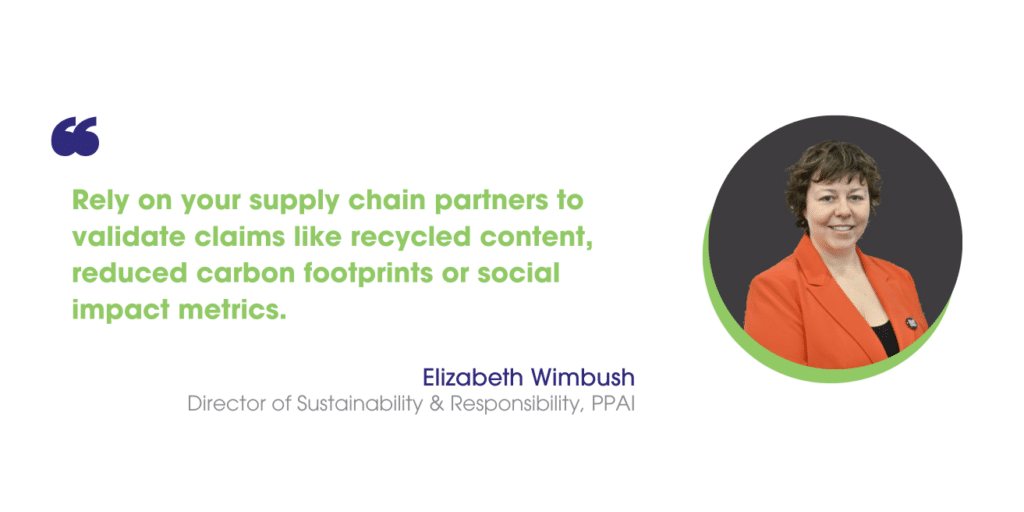The U.K. released updated guidelines for its “Green Claims Code” in September that offer the fashion industry additional guidance to ensure consumers aren’t misled by deceptive environmental marketing tactics. This update comes as businesses across the pond have anxiously awaited an overhaul of the Federal Trade Commission’s (FTC) “Green Guides” for over a decade.
- The U.K. promotional products industry generates more than $1 billion a year, according to Merchandise World.
The Competition and Markets Authority (CMA) — an independent department of the U.K. government that regulates consumer protection and competition — published the new rules to tackle greenwashing.
- Greenwashing is a marketing tactic that falsely frames a business or organization’s products, impact or services as environmentally friendly.
“We’ve cautioned a number of well-known brands to take a close look at their practices, consider this guide and make sure they’re not overstepping the mark when they promote their green credentials,” says Hayley Fletcher, interim senior director of consumer protection for the CMA. “All fashion companies — from designer labels to budget-friendly brands or independent boutiques — must be transparent and honest with their customers or risk enforcement action.”
- The CMA sent letters to 17 anonymous high-profile fashion brands advising them to review their business practices.
- Its updated guidance was influenced by a recent investigation that found the number of “green” claims being made by companies was on the rise, which led to top brands ASOS, Boohoo and George at Asda vowing to change the way they make environmental claims.
Some of the CMA’s updated recommendations include making accurate and clear environmental claims, being transparent with important information, avoiding the use of misleading images and making sure suppliers can back up sustainability claims.
The Green Guides
First issued in 1992, the Green Guides help businesses like those in the promotional products industry steer clear of making deceptive or unfair business claims. Some of the most common examples of these misleading assertions include:
- Aspirational claims and sustainability goals without data to track their progress.
- Falsely labeling packaging as recyclable; this title is only designated for products that “can be collected, separated or otherwise recovered from the waste stream through an established recycling program for reuse or use in manufacturing or assembling another item,” according to the Green Guides.
- Using third-party certifications that aren’t compliant with the Green Guides, like certain certifications from the One Health Certification Foundation — which the National Advertising Commission recommended be discontinued last year.
- Generally advertising a product as sustainable if there’s a process in the supply chain that can refute that claim.
The Green Guides have been updated three times since their inception: once in 1996, 1998 and 2012. The FTC has met multiple times over the years to discuss revising the guidance, with the most recent time being in 2023 after the agency opened a public comment period.
It was expected the 2023 meeting would bring new guidelines by 2024, according to Adweek, but those chances are slimming down as the year reaches a close.
Promo Perspective
The UK’s updated guidelines come only a few months after Canada passed new laws cracking down on greenwashing. Linked with a “deceptive market” provision, misleading the public with environmental claims can lead to $10 million fines in Canada. As a number of countries are beginning to shift the burden of proof on corporations, it is looking like a matter of “if,” not “when” the U.S. will adopt similar policies.

The CMA letters sent to the 17 fashion brands also reminded them of upcoming legislation. The Digital Markets, Competition and Consumers Act, which was enacted in the U.K. in May 2024, will give the CMA enforcement powers like the ability to impose financial penalties of up to 10% of a business’s worldwide turnover for breaches of consumer protection law. This will go into effect in April 2025.
“When in doubt, measure it out,” advises Elizabeth Wimbush, PPAI’s director of sustainability and responsibility. “Any impact claims you make should be backed by verified data. Rely on your supply chain partners to validate claims like recycled content, reduced carbon footprints or social impact metrics.”


